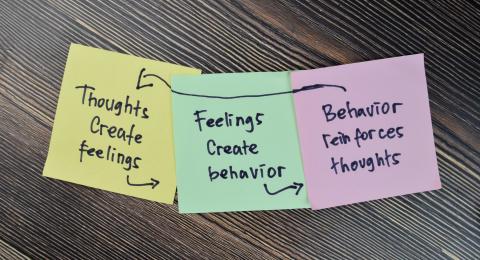What is Cognitive Behavioral Therapy (CBT)?
Cognitive Behavioral Therapy (CBT) is a type of talk therapy that has proven effective in treating people struggling with a mental health or substance use disorder. CBT focuses on changing the thoughts and emotions that can contribute to negative or problematic behavior. There are specific versions of CBT tailored to the needs of children and youth, helping the child understand the negativity of their thought patterns and learn how to replace them with more positive ones. Discovering new ways of looking at things helps a child or youth learn how to respond differently and improve rather than worsen stressful situations. Providers often work directly with the child or youth but can also include caregivers. CBT may also be delivered individually or in groups, in the office, the home, or other community-based settings. Residential treatment may also involve CBT.
MATCH is a system for treating multiple types of mental health and substance use disorders using the cognitive behavioral therapy approach.
What is Cognitive Behavioral Therapy for?
- Attention Deficit Hyperactivity Disorder (ADHD)
- Depression
- Anxiety
- Eating Issues
- Substance use
- Mental health challenges resulting from trauma.
Is Cognitive Behavioral Therapy effective?
Multiple studies have shown that youth treated with Cognitive Behavioral Therapy for anxiety disorders recover with a significant decrease in symptoms following treatment. Follow-up studies have shown that those positive effects will likely continue for 4 years post-treatment. Studies of adolescents with ADHD who received CBT significantly reduced symptom severity. CBT is also an effective treatment for children and youth who have problems functioning because of their exposure to traumatic events. The well-respected California Clearinghouse has given CBT a high rating for effectiveness in promoting effective practices.

Who provides Cognitive Behavioral Therapy?
Cognitive Behavioral Therapy is provided by trained clinicians at all of New Hampshire’s Community Mental Health Centers, as well as some school counselors, social workers, residential treatment staff, and private providers. CBT is also provided by substance use treatment providers in New Hampshire; however, they may not work with people under age 18.
What can I expect if I receive Cognitive Behavioral Therapy?
- The parent or caregiver, child, and therapist discuss the goals and develop a treatment plan.
- The therapist may work just with the youth.
- CBT involves a structured approach to solving problems in a specified number of sessions. Depending on the child or youth and their goals, it can be as few as six sessions or as many as 20 or more.
- While CBT is a type of talk therapy, it often involves worksheets, homework, role play, play therapy, or other strategies that help the child or youth try out new skills and ways of looking at their thoughts and feelings.
- CBT can be provided alone or in combination with medications or other therapies.
- The treatment plan can be adapted to meet cultural or regional differences.
- The sessions can be with just the child or youth, with the parent/caregiver and child, family-based, or in groups.
Cognitive Behavioral Therapy providers:
- Connect to the community mental health center in your region.
- To find other trained providers in NH, visit: Psychology Today
- For a national list of organizations that provide training in CBT, visit: The Academy of Cognitive Behavioral Therapies.
Certified Cognitive Behavioral Therapy Training:
- In person training at The Mental Health Center of Greater Manchester Training Center.
- Online self-paced training is available at: Beck Institute.
- Online training is available at: Association for Psychological Therapies.
- Online Trauma Focused Cognitive Behavioral Therapy at: The Substance Abuse and Mental Health Services Administration
Learn more:
For additional information about CBT, visit: The American Psychological Association.
- For an in-depth description of CBT for children and youth, check out this article on Healthline: How Is Cognitive Behavioral Therapy (CBT) Different for Kids?
- For more information on Trauma-Focused Cognitive Behavioral Therapies (TF-CBT): Effective Treatments for Youth Trauma (PDF)
- Studies of Cognitive Behavioral Therapy include:
- David, D., Cristea, I., & Hofmann, S. G. (2018). Why Cognitive Behavioral Therapy Is the Current Gold Standard of Psychotherapy. Frontiers in psychiatry, 9, 4. https://doi.org/10.3389/fpsyt.2018.00004
- Hofmann, S. G., Asnaani, A., Vonk, I. J., Sawyer, A. T., & Fang, A. (2012). The Efficacy of Cognitive Behavioral Therapy: A Review of Meta-analyses. Cognitive therapy and research, 36(5), 427–440. https://doi.org/10.1007/s10608-012-9476-1
- Pegg, S., Hill, K., Argiros, A., Olatunji, B. O., & Kujawa, A. (2022). Cognitive Behavioral Therapy for Anxiety Disorders in Youth: Efficacy, Moderators, and New Advances in Predicting Outcomes. Current psychiatry reports, 24(12), 853–859. https://doi.org/10.1007/s11920-022-01384-7


